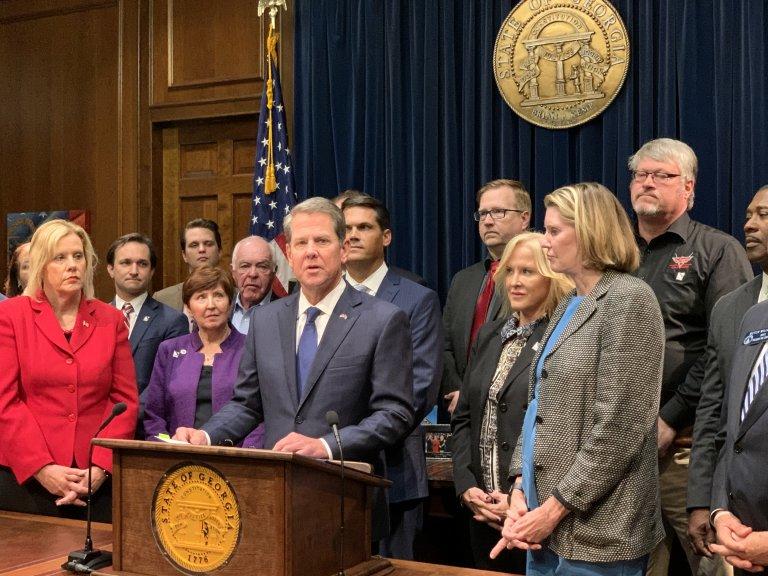
Caption
Gov. Brian Kemp originally unveiled his plan to reshape Georgia's private insurance market back in November. A revised version of the proposal was announced earlier this month. / Georgia Recorder
Credit: JIll Nolin

Gov. Brian Kemp originally unveiled his plan to reshape Georgia's private insurance market back in November. A revised version of the proposal was announced earlier this month. / Georgia Recorder
A revised version of the governor’s plan to remake the private insurance market in Georgia continues to draw opposition to the state’s plan to bypass healthcare.gov.
Marla Loyal, an Atlanta resident who said she purchased insurance through the federal marketplace this year without assistance, said she finds Gov. Brian Kemp’s proposal confusing.
“I’m a college educated person. I am working on my master’s degree,” Loyal said during a public hearing held Wednesday. “So, if I can’t figure it out or if I’m having a hard time with something, I know the average person who doesn’t have my level of education would struggle with it as well."
“I think this is another barrier to deny poor people access to health care,” she said. “I feel like it is class warfare and it’s not fair. It’s not moral to do this to people during a public health crisis.”
Loyal was one of a handful of people who spoke at Wednesday’s public hearing, which was the last of two meetings. Thursday is the final day to submit written feedback on the plan, with the deadline just before midnight.
As of Wednesday, 338 written comments had been submitted to the state Department of Community Health. The revised proposal is part of the governor’s health care plan that is pending federal review.
For the most part, advocates have said they see the changes as improvements. But they say they continue to have concerns with the underlying proposal, which would allow Georgia to bypass healthcare.gov and send consumers directly to insurance companies or brokers.
“Under the Georgia Access Model, the state would deny Georgians the freedom to enroll in coverage through healthcare.gov and instead require that they use insurers, brokers, and private websites (options available to them already),” wrote June Deen, senior director of advocacy for the American Lung Association in Georgia.
“This plan increases the risk that people will enroll in coverage with inadequate benefits through private entities that may not help patients choose the best plan for their health needs,” she said.
The plan, first unveiled last November, would also allow Georgia to create a reinsurance program that is meant to attract more insurers to underserved areas of the state and lower insurance premiums. The reinsurance program, which has largely gained public support, has been delayed a year because of the pandemic and is now proposed to start in 2022.
A more controversial separate waiver proposal, which is not part of the ongoing public review, calls for a limited form of Medicaid expansion that would provide coverage to about 50,000 low-income adults but would require participants to work or participate in another “qualifying activity.”
Laura Colbert, executive director of Georgians for a Healthy Future, which is a consumer health advocacy group, called the proposed reinsurance program “good evidence-based policy making” that would likely succeed in curbing premiums in Georgia.
But Colbert said the opposite is true for the state’s accompanying plan to circumvent the federal marketplace. She said investing in a community-based approach would more effectively increase awareness among consumers of their options and boost enrollment. She said it would also be a more racially just and equitable approach.
“Local enrollment assisters are a lot more likely to reflect their communities than people who are working in the insurance sector,” Colbert said. “Whether they are brokers or agents or otherwise, the insurance sector is a very white sector.”
This story comes to GPB through a reporting partnership with the Georgia Recorder